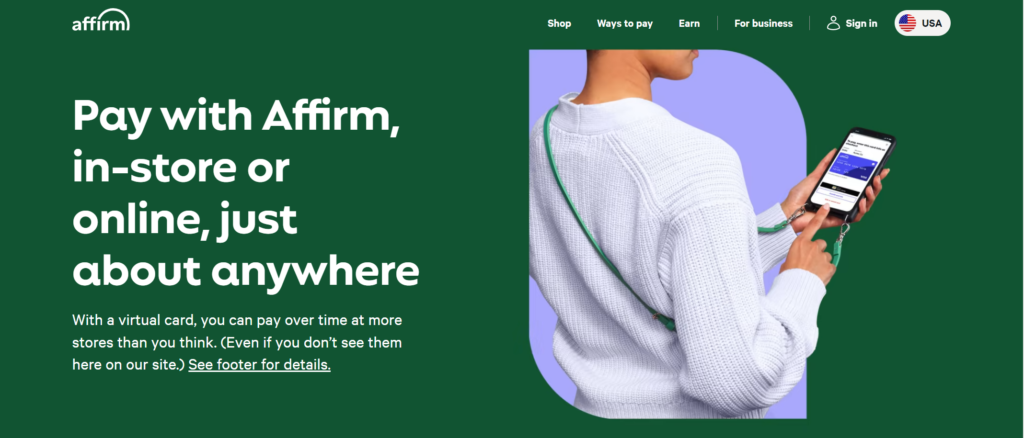Affirm is transforming how people make payments for goods and services. Affirm provides customers with an alternative to traditional credit cards by enabling them to make purchases and pay for them over time with set monthly installments.
This gives customers greater freedom and control over their money, and it has helped Affirm establish itself as a reliable partner for both customers and businesses.
In this post, we’ll look at how Affirm makes money and how it’s grown into a successful and lucrative organization.
We’ll look at Affirm’s business model, including consumer loan interest, transaction fees, interchange fees, and loan sales to third-party investors. Understanding these income streams allows us to better understand Affirm’s business model and its role in the financial technology market.
Also read: Binance Business Model: How does Binance work and make money?
How does Affirm make money?
Affirm earns money via consumer loan interest, transaction fees, interchange fees, and loan sales to third-party investors. It charges customers interest on loans and merchants a transaction fee for each transaction. Affirm also earns money from the sale of some of its loans and receives interchange fees when consumers use virtual credit cards. The particular amounts and charges change based on the transaction specifics.
Let’s now take a deep dive into Affirm, it’s business model, and how it makes money.
What is Affirm?

Affirm, as a financial technology startup, was established in 2012 by Max Levchin, a co-founder of PayPal. It is dedicated to offering customers a more convenient method to pay for products. Affirm helps people to make educated financial decisions and take control of their spending by delivering set monthly payments with no hidden fees or compounding interest.
Affirm has worked with hundreds of retailers to offer payment options in addition to its consumer-focused business strategy. This enables businesses to offer an alternative to traditional credit cards to their clients while also benefiting from Affirm’s transparent and user-friendly payment mechanism.
Affirm has established a trusted name in the financial technology sector with its mix of consumer-friendly solutions and solid connections with merchants. The firm is now active in the United States and Canada, and it has made loans to millions of customers. Its average loan amount is $750, however, it provides loans up to $17,500. Affirm is also funded by notable investors including Andreessen Horowitz, Khosla Ventures, and Spark Capital.
Also read: How Does Patreon Make Money? [Updated]
How does Affirm make money?
Affirm earns money through a variety of sources, including consumer loan interest, transaction fees, interchange fees, and loan sales to third-party investors. Let’s look at each of these revenue streams in more detail.
Consumer loan interest
Affirm earns money by charging customers interest on the loans it provides. The typical loan size is $750, although it provides loans up to $17,500. The actual interest rate is determined by the agreement with the merchant and the buyer’s creditworthiness.
Transaction fees
Affirm generates money by charging merchants a processing fee for each transaction, in addition to the interest it charges on loans. This charge is calculated as a percentage of the total transaction amount and is used to cover the costs of processing the transaction and loan management. The fee’s actual amount is determined by the merchant’s predicted sales volume, purchase price, and product category.
Interchange fees
When clients utilize virtual credit cards via existing credit card processing networks, Affirm also gets interchange fees. This charge fluctuates between 7% and 10%, based on the merchant’s estimated sales volume, purchase price, and product category.
Sale of loans to third-party investors
Affirm also earns money by selling its loans to third-party investors. This enables the corporation to make extra revenue while potentially lowering its own risk. The effectiveness of this technique, however, is dependent on the nature of the transaction and the individual loans that are sold. Affirm may profit from the sale in certain situations, while it may lose money in others.
Products and Services Offered by Affirm
Affirm offers a range of financial technology products to consumers and merchants. These products include:
Consumer loans
Affirm’s main offering is consumer loans, which allow customers to make items and pay for them with set monthly payments over time. These loans are provided in collaboration with retailers and provide consumers with an alternative to standard credit cards.
Virtual credit cards

Affirm also provides virtual credit cards, which are digital replicas of regular credit cards. Consumers may use these virtual credit cards to make purchases online or in-store, and they provide many of the same perks as regular credit cards.
Merchant services
Affirm also provides merchant services, like integration with prominent e-commerce platforms and POS systems. These services make it simple for retailers to provide Affirm’s payment solutions to their consumers, resulting in a more flexible and user-friendly payment experience.
What is the Business Model of Affirm?
- Affirm collaborates with retailers to provide financing choices to clients at the time of sale. This may be accomplished in a variety of ways, including incorporating Affirm’s payment platform into the merchant’s checkout page or providing Affirm financing in-store.
- When a consumer is at the checkout page of a participating merchant and chooses Affirm as their payment option, they can apply for a loan to pay for their purchase. This application procedure is quick and simple, and consumers often receive a decision in a matter of seconds.
- If the customer’s loan application is granted, they can use the loan given by Affirm to complete their purchase. Before the consumer completes the transaction, the loan amount, interest rate, and loan conditions are plainly disclosed.
- Affirm earns money by charging the consumer interest on the loan. The interest rates offered by Affirm are competitive and are intended to be more consumer-friendly than alternative lending choices.
- Affirm handles the loan and collects payments from the consumer during the term of the loan. This involves sending payment reminders and alerts, as well as offering customer care for any problems or inquiries the customer may have.
- Affirm’s connection with the consumer is complete once the loan is repaid. However, the organization may continue to work with the merchant to provide prospective clients with financing alternatives.
Affirm’s overall business concept is upon offering clients convenient and inexpensive financing choices at the time of transaction. The corporation generates revenue by collecting interest on the loans it offers to consumers.
Affirm SWOT Analysis
| SWOT Element | Description |
|---|---|
| Strengths | Strong merchant alliances: Affirm has formed agreements with numerous well-known retailers, like Walmart, Expedia, and Overstock, allowing the company to provide its financing solutions to a diverse spectrum of clients. |
| Financing solutions for consumers: Affirm’s financing options are intended to be accessible and cheap to consumers. The organization distinguishes itself from other finance providers by offering fixed monthly payments, straightforward pricing with no hidden costs, and the chance to pay off the loan early without penalty. | |
| Rapid and simple application procedure: Affirm’s loan application process is simple and quick, with consumers often receiving a decision in a matter of seconds. Customers can apply for and get loans at the point of sale as a result of this. | |
| Weaknesses | Limited to online and select in-store purchases: At the moment, Affirm’s financing alternatives are only accessible for online and select in-store purchases, limiting the company’s potential consumer base. Customers who prefer to purchase in-store or do not shop at partnering merchants will be unable to access Affirm’s financing solutions. |
| Dependence on merchant relationships: Affirm’s success is primarily dependent on merchant partnerships. It is possible that the company’s operations might suffer if it lost key partners. For example, if a big partner, like Walmart, terminates its association with Affirm, the company’s income may suffer. | |
| Opportunities | Expansion into other sectors and markets: Affirm has the ability to expand into new industries and markets, such as providing education or healthcare financing. This might provide the organization with additional revenue streams and allow it to service a broader spectrum of clients. |
| Continued ecommerce growth: As the e-commerce business expands, Affirm will have an additional opportunity to provide its financing choices to online buyers. This might result in a rise in the number of clients utilizing Affirm’s financing choices, allowing the company to flourish. | |
| Threats | Competition from other finance companies: The financing sector is crowded, and Affirm may encounter competition from other suppliers offering comparable lending solutions. These rivals may provide cheaper interest rates or more appealing loan arrangements, making it difficult for Affirm to attract and maintain consumers. |
| Economic downturns: Economic downturns can have a detrimental influence on consumer spending and borrowing, which might harm Affirm’s operations. If customers are unable to borrow or are hesitant to take on additional debt, the number of loans generated by Affirm may decline. This might have a detrimental impact on sales and profitability for the organization |
How would you improve Affirm’s business model?
The Affirm business model has proven to be effective in offering consumers an alternative to traditional lending choices. Affirm has attracted a big and devoted client base by providing transparent and flexible payment arrangements.
Furthermore, the company’s emphasis on financial literacy and smart borrowing has helped to distinguish it from its competitors. And overall, Affirm’s distinct approach to consumer financing has contributed to its success and has positioned it for future expansion.
If you enjoy reading financial business models, you may also like the Etrade business model.



![Read more about the article How Does LinkedIn Make Money? [Business Model]](https://moneymodels.org/wp-content/uploads/2020/11/How-does-Linkedin-make-money-300x150.jpg)
